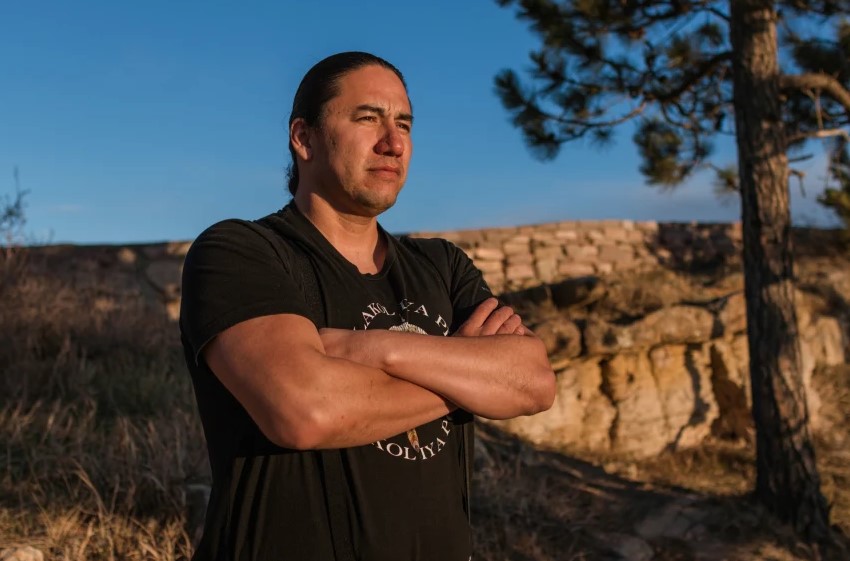Two sides to Lakota Language Consortium story
STANDING ROCK—Race relations can get sticky regarding Natives and white men when it comes to tribal language, customs and traditions. A good example is the recent conflict between certain members of the Standing Rock Sioux Tribe and the Lakota Language Consortium (LLC). The LLC has been working for the past 15 years to help preserve the Lakota language. This preservation process took time, money and effort. Wil Meya, a former student at the Oglala Lakota College, and head linguist, Jan Ullrich, both non-Natives, are the main people behind LLC. Meya, who would work as CEO for a non-profit organization, would also work with other tribes to revitalize other languages.
A McLaughlin High School teacher, Ray Taken Alive, who teaches Lakota, wanted to gain access to some of this Lakota knowledge the LLC now had in their possession. This information was set in books and copyrighted. He was informed if he wanted a copy, he would have to buy a copy.
Taken Alive’s reaction was this was an outright theft of the tribe’s language.
“No matter how it was collected, where it was collected, when it was collected, our language belongs to us. Our stories belong to us. Our songs belong to us,” Taken Alive told the tribal council in April.
Taken Alive has been building his case for two years, and the tribal council voted to banish the Lakota Language Consortium from setting foot on the reservation. Two of Taken Alive’s family elders had contributed to the efforts to preserve the language. Others of the tribe, had been interviewed, recorded, and helped the project along. Kevin Locke, a noted hoop dancer and Standing Rock tribal member,. Did a lot of work with the LLC, and wrote a letter to the Lakota community.
“As a Standing Rock tribal member who has been involved with the Lakota language for my entire life,” Locke wrote, “I am saddened to see the decision by the Standing Rock Tribal Council to ban the Lakota Language Consortium and Jan Ullrich and Wil Meya who have a long history of contributing positively to the Lakota language documentation and revitalization. I have reasons to believe that this decision was ill-informed by a manipulative narrative full of propaganda.”
“If the proponents of this narrative were sincerely concerned with the future of our Lakota language,” Locke continued, “they would have called for a constructive dialogue. Instead, they resorted to spreading misinformation, gossip, manipulations, slander, unsubstantiated allegations, defamation, and ad-hominem attacks disguised as facts. The worst part is that the proponents of this narrative have actively sought to stigmatize all who voice different views. They have manipulated identity politics and decolonization rhetoric to label their opponents. I believe that this type of narrative is counter-productive to our shared goals of language revitalization.”
Locke then addressed the core concern of the controversy: “A language cannot be copyrighted. Joseph Flying By, Ella Deloria, Beatrice Medicine, David Rood, Albert White Hat, Eugene Buechel, Ivan Starr and many others have published copyrighted books to share the language and culture. And we have benefited from their work. In the same way, we benefit from LLC publishing the collaborative work of many first-language speakers.”
“The question of orthography is another topic that has been manipulated by the social media campaign,” Locke said. “The allegation that LLC bullied people into using an orthography is beyond absurd. Standing Rock tribal representatives, educators, and elders, such as Jesse Taken Alive and Delores Taken Alive, invited the LLC to Standing Rock specifically so that the schools could have a standard orthography and curriculum. The use of the orthography was supported by the tribal department of education and the tribal council who voted to partner with the LLC on it. The fact that the orthography has been chosen by our tribal schools and by the Dakota/Lakota Summer Institute and used by them for the past 16 years is clear evidence. Is Standing Rock going to act on a whim and abandon a 16-year-long trajectory started by our wise Elders?”
“LLC has facilitated valuable work on behalf of Lakota language documentation and revitalization,” Locke concluded. “It contributed to increasing local capacity by organizing many educational events and programs, it wrote grants to fund scholarships and many of our tribal members have benefited from them. More than 80% of the LLC materials are digital and free. But there is a cost associated with printing books and that is why hard copies are not free. Costs have to be covered in order for materials to stay in print.”
The deeper issue is whether any language can be owned by the Native speakers, or is it knowledge any person can acquire through exposure and diligent study. The rub appears to be having to pay for materials. Is the LLC cynically trying to profit off Lakota language, or are detractors overreacting because they are offended because they have to pay for twenty percent of the LLC materials?
(Contact Joe Budd at sales2@nativesunnewstoday.today)
The post Two sides to Lakota Language Consortium story first appeared on Native Sun News Today.

